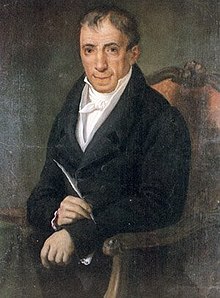Adamantios Korais
Adamantios Korais ( Greek Αδαμάντιος Κοραής - Adamántios Koraís, also Koraés ; born April 27, 1748 in Smyrna , Asia Minor , Ottoman Empire ; † April 6, 1833 in Paris ) was a Greek scholar and writer . Korais is considered a reformer of Greek literature .
Life
Korais was born in Smyrna, but his father was from the island of Chios and Korais felt very attached to the island. Korais graduated from the Evangelical School of Smyrna and spent most of his life not in Greece but in Western Europe. He studied the old and new languages at an early age, then learned the trade of a businessman in Amsterdam at the request of his father . From 1782 he studied medicine and natural history in Montpellier . Korais settled in Paris in 1788 to devote himself entirely to literature . Although he was naturalized in France, he remained true to his Greek origins. Korais dealt with the church, school, science and politics. From Paris he fought with word and writing for the spiritual rebirth of Greece. Its main goal was to develop a national, Greek general language into a written language ; the norms he set up for this purpose are still largely authoritative today. Korais tried to awaken the Greeks' awareness of their historical heritage, their Hellenistic origins. He stated that general education is the key to independent Greece. Above all, however, Korais is known for his decisive role in the Greek language question : he tried to strike a middle path between the ancientizing standard language and the vernacular and went down in Greek language history as the inventor of the Katharevousa (= the pure ; the purified vernacular).
In his letters and publications, Korais criticized the Greek Orthodox Church , which ruled the life of his compatriots in the Ottoman Empire . The church strictly rejected an independent Greece. Korai's knowledge of classical antiquity came from studying the editions of ancient Greek writers. His marble bust adorns the Lykeion on the Greek island of Chios , to which Korais bequeathed his valuable library, today's Korais library , named after him (Δημόσια Κεντρική Ιστορική Bιβλιοθήκη Χίου Κοραή).
The chair of Byzantine and Neo- Greek Studies at King's College London , the Koraes Professor of Modern Greek and Byzantine History, Language and Literature , is named after him .
Fonts (selection)
- Atakta, ou mélanges sur la littérature grecque modern , Paris 1828–35, 5 volumes.
- Mémoire sur l'état actuel de la civilization de la Grèce , Paris 1803 or in German Hellenion , Leipzig 1822.
- Legacy writings and letters , Athens 1881–87.
literature
- Richard Clogg (1976): The Movement for Greek Independence 1770-1821: A Collection of Documents . Edited and translated and with an introduction by ... London and Basingstoke: The Macmillan Press (Studies in Russian and East European History). (including edition of Korais' autobiography).
- Richard Clogg (1992): A Concise History of Greece . Cambridge: Cambridge University Press (Cambridge Concise Histories). (Brief summary of Korais' life path, pp. 216f.).
- Claudia Hopf (1997): Linguistic nationalism in Serbia and Greece: Theoretical foundations and a comparison of Vuk Stefanovic Karadzic and Adamantios Korais . Wiesbaden. ISBN 3-447-03953-1 .
- Alexandros Papaderos (1970): Metakenosis: Greece's cultural challenge through the Enlightenment from the perspective of the Korais and the Oikonomos . Meisenheim am Glan: Verlag Anton Hain.
- Petros Petratos (Πέτρος Πετράτος): Ο Α. Κοραής και η Κεφαλονιά. Η ονοματοδοσία της λέσχης «Μουσείον ο Κοραής» (1843). In: Ο Ερανιστής 25, 2005, 281-299.
- Vincenzo Rotolo (1965): A. Korais e la questione della lingua in Grecia. Palermo: Presso l'Accademia (Quaderni dell'Istituto di filologia greca dell'Universita di Palermo).
Web links
- Literature by and about Adamantios Korais in the catalog of the German National Library
- Modern Greek Literature, Literature of Authors of Greek origin (English)
- Korais . In: Meyers Konversations-Lexikon . 4th edition. Volume 10, Verlag des Bibliographisches Institut, Leipzig / Vienna 1885–1892, p. 76.
- Katharevousa: The Purification of the Greek Language ( Memento of November 22, 2002 in the Internet Archive ) (English)
| personal data | |
|---|---|
| SURNAME | Korais, Adamantios |
| BRIEF DESCRIPTION | Greco-French scholar and writer |
| DATE OF BIRTH | April 27, 1748 |
| PLACE OF BIRTH | Smyrna , Asia Minor |
| DATE OF DEATH | April 6, 1833 |
| Place of death | Paris , France |
